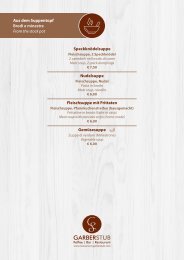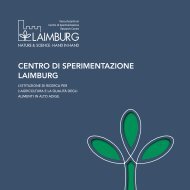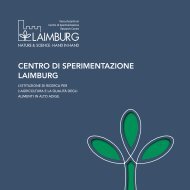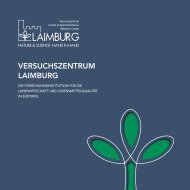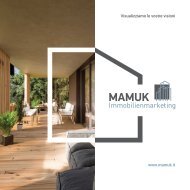Laimburg Image brochure | English
Create successful ePaper yourself
Turn your PDF publications into a flip-book with our unique Google optimized e-Paper software.
LAIMBURG<br />
RESEARCH CENTRE<br />
THE LEADING RESEARCH INSTITUTE<br />
FOR AGRICULTURE AND<br />
FOOD PROCESSING IN SOUTH TYROL
OUR<br />
MISSION<br />
<strong>Laimburg</strong> Research Centre is named after the ancient ruin of <strong>Laimburg</strong>, a castle located on a<br />
mountain pass, known as the Kreit Saddle, on the southern Mitterberg Ridge. The Kreit Saddle<br />
connects Kaltern / Caldaro Lake with the village of Pfatten / Vadena. The hilltop castle was<br />
built in the 13th century and given as a fief to Heinrich Laian, a citizen of Bozen / Bolzano, after<br />
whom it was probably named. It was later managed by the Lords of Rottenburg. By the late<br />
15th century, the castle was already abandoned and beginning to fall into disrepair. <strong>Laimburg</strong><br />
Research Centre and the <strong>Laimburg</strong> Technical School for Fruit Growing, Viticulture, and Horticulture<br />
were named after these ruins.<br />
APPLIED AND BASIC RESEARCH<br />
SOLUTIONS FOR AGRICULTURAL PRACTICE<br />
SUSTAINABLE AGRICULTURE AND FOOD PROCESSING<br />
ECOLOGICAL AND ECONOMIC SUSTAINABILITY<br />
TO BOOST THE COMPETITIVENESS OF LOCAL COMPANIES<br />
TO ENHANCE THE QUALITY OF LOCAL AGRICULTURAL<br />
PRODUCTS AND FOODS<br />
TO STRENGTHEN OUR CULTURE OF INNOVATION
MORE THAN 200<br />
CO-WORKERS<br />
350 RESEARCH PROJECTS<br />
AND ACTIVITIES<br />
450 LECTURES AND<br />
PUBLICATIONS PER YEAR<br />
SOUTH TYROL FEATURES SEVERAL DIFFE-<br />
RENT CLIMATIC AND GEOLOGICAL CONDI-<br />
TIONS IN CLOSE GEOGRAPHICAL PROXIMITY<br />
At higher altitudes, agricultural activities mainly involve animal husbandry,<br />
grassland management, and commercial forestry. Fruit and wine-growing are<br />
concentrated in the valley floors, where milder climatic conditions and more<br />
fertile soils are to be found.<br />
South Tyrol is typically characterised by small-scale agricultural businesses and<br />
family farms. The competitiveness of these smaller enterprises is supported by<br />
strong cooperatives.<br />
THE GOAL OF LAIMBURG RESEARCH CENTRE IS TO PROMOTE SUS-<br />
TAINABLE AGRICULTURE AND TO ASSIST, SUSTAIN, AND FURTHER<br />
DEVELOP LOCAL AGRICULTURAL BUSINESSES AND FOOD PROCES-<br />
SING COMPANIES.<br />
RESEARCH NETWORK<br />
<strong>Laimburg</strong> Research Centre is part of a<br />
research network of national and<br />
international partners.<br />
The research activities of <strong>Laimburg</strong> Research Centre support the entire agricultural<br />
and food processing sectors in South Tyrol – from cultivation all the<br />
way up to the finished product, from the valley floor up to high altitude.<br />
<strong>Laimburg</strong> Research Centre was founded in 1975 as a public body of the Autonomous<br />
Province of Bozen / South Tyrol. It is thus the main research facility for the<br />
South Tyrolean agricultural and food processing sectors.<br />
With its experimental activities and scientific research, <strong>Laimburg</strong> Research Centre<br />
creates know-how, develops practical solutions and innovative strategies for a<br />
sustainable and resilient agri-food system in South Tyrol.
THE 2021-2030 RESEARCH<br />
FOCUS PROGRAM<br />
THE LAIMBURG PORTFOLIO<br />
ANNUAL PROGRAMME OF ACTIVITIES<br />
The activities programme is developed every year in collaboration with various stakeholders<br />
in the South Tyrolean agricultural and food processing sectors.<br />
SUSTAINABLE AND RESILIENT CULTIVATION SYSTEMS<br />
Unlocking nature’s full potential. We develop sustainable and demand-oriented<br />
cultivation techniques to protect and preserve natural resources and<br />
biodiversity, and to support agricultural businesses in the Alpine region.<br />
THIRD-PARTY FUNDED PROJECTS AND CONTRACT RESEARCH<br />
<strong>Laimburg</strong> Research Centre carries out many research projects with funding from European<br />
and local programmes. It also conducts research activities on behalf of local<br />
companies to achieve concrete solutions.<br />
DIGITAL INNOVATION AND SMART TECHNOLOGIES<br />
Developing future-oriented cultivation and processing techniques. We implement<br />
digitalisation and modern breeding methods into actual practice.<br />
CLIMATE-NEUTRAL AGRICULTURE<br />
Developing cultivation and processing methods that are more climate-friendly.<br />
We develop agricultural practices with a smaller climate footprint<br />
and higher carbon capture rate, and we adapt cultivation methods to<br />
future climate conditions.<br />
SERVICES AND OPEN LAB<br />
<strong>Laimburg</strong> Research Centre offers services – analysis and consulting – in all<br />
areas of its research.<br />
The Open Lab Concept allows South Tyrolean start-ups and companies to access the<br />
Research Centre’s labs and equipment, and the Research Centre’s researchers and<br />
experts provide them with the support they need.<br />
QUALITY AND HEALTH<br />
Safe and healthy food products from South Tyrol. We develop innovative<br />
methods which companies in South Tyrol can employ to produce food<br />
products of certified quality and origin.<br />
LOCAL DIVERSITY AND CIRCULAR ECONOMY<br />
Valorising regional mountain products. We promote the diversity of<br />
high-quality mountain products and ensure that they are utilised in a (supra-)regional<br />
circular economy.<br />
LAIMBURG RESEARCH CENTRE IS A RESEARCH<br />
PARTNER OF NOI TECHPARK<br />
NOI Techpark is a powerhouse for innovation in South Tyrol. Companies, start-ups,<br />
research facilities, and the Free University of Bozen / Bolzano come together to carry<br />
out research and development in the technological fields Food, Green, Automotive/<br />
Automation, and Digital.<br />
<strong>Laimburg</strong> Research Centre is part of NOI Techpark and co-ordinates the area Food in<br />
conjunction with the Free University of Bozen / Bolzano.
INSTITUTE FOR FRUIT<br />
GROWING AND<br />
VITICULTURE<br />
VARIETY INNOVATION,<br />
ORGANIC AGRICULTURE,<br />
„SMART“ FARMING,<br />
COMPLEMENTARY CROPS,<br />
SUSTAINABILITY,<br />
BREEDING TECHNOLOGIES,<br />
CERTIFIED PROPAGATION MATERIAL.<br />
This institute develops practical solutions for the South<br />
Tyrolean fruit and wine-growing sector. The main goal<br />
of its research activities is to develop methods for the<br />
ecologically and economically sustainable production of<br />
high-quality fruit and wholesome grapes and to implement<br />
these methods in actual practices.<br />
THE SOUTH TYROLEAN GENE BANK<br />
This institute maintains a gene bank to<br />
preserve agriculturally interesting apple<br />
and grape varieties in South Tyrol.<br />
THE „FRUIT GROWING“ RESEARCH<br />
AREA<br />
The „Fruit Growing“ research area works to promote and<br />
support fruit growing in South Tyrol by introducing new<br />
THE „WINE GROWING“ RESEARCH<br />
AREA<br />
The main goal of the „Wine Growing“ reseach area is to<br />
improve the quality of grapes and wine. To achieve this,<br />
THE „ENOLOGY“ RESEARCH AREA<br />
The task of the „Enology“ research area is to support the<br />
wine sector by conducting enological experiments in the<br />
wine cellar and by further developing enological techno-<br />
SERVICES AND CONSULTING<br />
Enological consulting<br />
Professional consulting and training in enological<br />
techniques.<br />
fruit varieties and cultivars, further developing cultivation<br />
systems and pruning methods, optimising irrigation and<br />
fertilisers, and developing future-oriented practices in<br />
organic fruit growing.<br />
the „Wine Growing“ research area develops and tests innovative,<br />
efficient, and sustainable methods of vineyard<br />
management for a more efficient use of natural resources<br />
like soil and water.<br />
logy. It also carries out soil suitability studies for individual<br />
grape varieties, analyses the quality of wines made using<br />
new grape clones and performs chemical and sensory tests<br />
of wines –including by means of wine-tasting panels.<br />
Certified grape varieties and propagation material<br />
Provision of grape varieties and propagation material,<br />
certified according to Italian and/or European law.<br />
Secretary’s office: +39 0471 969 625
INSTITUTE FOR<br />
MOUNTAIN<br />
AGRICULTURE AND<br />
FOOD TECHNOLOGY<br />
The Institute for Mountain Agriculture and Food Technology<br />
supports the South Tyrolean mountain agricultural<br />
sector through scientific research, not only in cultivation<br />
but also in the processing of raw materials to make<br />
typical South Tyrolean products.<br />
THE GENE BANK<br />
This institute manages a gene bank for<br />
the identification and conservation of<br />
local cereal, pseudo cereal, and vegetable<br />
varieties.<br />
THE „MOUNTAIN AGRICULTURE“<br />
RESEARCH AREA<br />
The „Mountain Agriculture“ research area conducts applied<br />
research ranging from the South Tyrolean meadowlands all<br />
the way to complementary crops like arable crops, herbs,<br />
and vegetables. This includes selecting varieties and<br />
optimising cultivation techniques in terms of agronomy and<br />
ecology; developing seed mixes for growing fodder; but<br />
also protecting local phytogenetic resources for cereals.<br />
SERVICES AND CONSULTING<br />
Storage and post-harvest biology<br />
Validation and development of innovative storage technologies.<br />
Optimal quality and degree of ripeness in the<br />
post-harvest chain. Consulting on optimal storage methods<br />
to prevent the loss of goods due to pathogenic<br />
organisms and metabolic diseases, and to maintain optimal<br />
fruit quality.<br />
Fruit and vegetable processing<br />
Optimisation of processing methods and shelf-life of<br />
foods to improve quality and safety. Analysis of physico-chemical<br />
and microbiological stability of foods as well<br />
as of the thermo-physical and mechanical properties of<br />
individual ingredients and finished products.<br />
Meat products<br />
Development of new products and promotion of local<br />
products by providing support for the optimisation and<br />
innovation of production and preservation processes, according<br />
to statutory regulations pertaining to the food<br />
sector.<br />
GRASSLAND FARMING,<br />
FOOD PROCESSING,<br />
SENSORY SCIENCE,<br />
STORAGE, ARABLE CROPS,<br />
VEGETABLE-GROWING, MEADOWLAND<br />
AND GRASSLAND MANAGEMENT, PRO-<br />
DUCTION CHAIN,<br />
VALUE-ADDED CHAIN, PRODUCT<br />
INNOVATION, FIELD-TO-SHELF.<br />
THE „FOOD TECHNOLOGY“<br />
RESEARCH AREA<br />
The „Food Technology“ research area develops cutting-edge<br />
preservation technologies for long-term fruit<br />
storage. It also optimises processing techniques for<br />
food products including fermented products, distilled<br />
spirits, juices, purees, and canned goods as well as milk<br />
and meat. Sensory analyses are performed to investigate<br />
foods and thus determine consumer preferences to support<br />
market research in the development of new products.<br />
Fermentation and distillation<br />
Development, optimisation, and consulting on such topics<br />
as food safety and processing techniques for the<br />
manufacture of fermented beverages and foods, fruit<br />
brandies, and liqueurs.<br />
Sensory science<br />
Sensory and technical characterisation of foods based on<br />
sensory analyses carried out by qualified tasters. Physico-chemical<br />
analyses and consumer tests.<br />
Secretary’s office: +39 0471 969 540
INSTITUTE FOR<br />
PLANT HEALTH<br />
THE „PLANT PROTECTION“<br />
RESEARCH AREA<br />
THE „HORTICULTURE“<br />
RESEARCH AREA<br />
BIOLOGICAL CROP PROTECTION,<br />
NATURAL ANTAGONISTS,<br />
DIVERSITY OF SPECIES,<br />
PLANT PROTECTION PRODUCTS,<br />
GREEN AREAS, PARASITOIDS,<br />
VIRAL DISEASES.<br />
The goal of this institute is to maintain the health of cultivated<br />
crops and ornamental plants by evaluating and developing innovative<br />
strategies for the prevention and control of pests and<br />
diseases. Activities range from basic research in the lab all the<br />
way up to field experiments for the purpose of devising solutions<br />
for agriculture and horticulture.<br />
The „Plant Protection“ research area develops and<br />
evaluates innovative, sustainable strategies to regulate<br />
plant pathogen populations that can be implemented in<br />
actual practices. The goal is both to protect harvests and<br />
to meet the requirements of farmers, consumers, and<br />
the environment.<br />
This research area establishes and develops networks offering<br />
consulting and promoting the application of research<br />
findings in South Tyrolean horticulture. The goal is to capitalise<br />
on and protect the ecological, social, aesthetic, urbanistic,<br />
and cultural values of green areas in a sustainable fashion.<br />
This research area also promotes biodiversity. It is responsible<br />
for coordinating the „Natur im Garten Südtirol“ initiative.<br />
SERVICES AND CONSULTING<br />
Laboratory for Virology and Diagnostics<br />
Diagnostics based on microbiological, serological, or biomolecular<br />
tests of diseases affecting crops and ornamental<br />
plants caused by bacteria, fungi, phytoplasmas, viruses,<br />
or viroids. Phytopathological tests to identify quarantine<br />
diseases, and analyses for monitoring compliance in accordance<br />
with E.U. Plant Protection Directive 2016/2031.<br />
Research Area Horticulture<br />
Free consultation on obtaining the „Natur im Garten“certification<br />
and various topics related to public green areas.<br />
Secretary’s Office: +39 0471 969 600
INSTITUTE FOR<br />
AGRICULTURAL<br />
CHEMISTRY AND<br />
FOOD QUALITY<br />
Cutting-edge molecular and microbiology, chemical<br />
testing and spectroscopy methods are used to analyse<br />
plants and foods. These tests, like proof of authenticity<br />
of varieties and rootstocks, are used for in-house projects<br />
and offered as a service to third parties.<br />
The Institute performs research on the basic principles<br />
and causes of the development and spread of plant diseases,<br />
such as apple proliferation.<br />
OPEN LAB<br />
LABORATORY OF FOOD MICROBIOLOGY<br />
Microbiological testing and characterisation of the microbial<br />
state of foods to guarantee the safety and quality of<br />
various foods. Tests are based on the detection of a specific<br />
micro organism or the determination of the total bioburden<br />
in a food product.<br />
LABORATORY FOR WINE AND BEVERAGES ANALYSIS<br />
Analysis of the chemical and physical parameters of wines,<br />
musts, spirits, fruit and grape juice, including determination of<br />
free and total sulphur. Annual performance of ripeness tests<br />
on local grapes as an aid to deciding the ideal moment for<br />
harvesting.<br />
LABORATORY OF RESIDUES AND CONTAMINANTS<br />
Chemical analysis to check the presence of plant protection<br />
product residues (fungicides, insecticides, herbicides) and<br />
contaminants in food and water. Analysis of the degradation<br />
and drift behaviour of new active plant protection substances.<br />
LABORATORY FOR SOIL AND PLANT ANALYSIS<br />
Chemical analysis of nutrients in agricultural soil, garden substrates,<br />
compost, organic fertilisers, manure, mineral fertilisers<br />
and irrigation water, as well as in plant organs, such as<br />
leaves and fruit. Thanks to these analyses, it is possible to<br />
check that plants are being provided with an optimum supply<br />
of nutrients.<br />
LABORATORY OF MOLECULAR BIOLOGY<br />
Analysis and sequencing of plant DNA and RNA using cutting-edge<br />
equipment. Qualitative and quantitative methods<br />
to identify the authenticityof apple and grape varieties.<br />
Institute Secretary: +39 0471 969 550<br />
LABORATORY FOR FLAVOURS AND METABOLITES<br />
Analysis of components naturally present in food and<br />
plants, using cutting-edge analytical methods to study quality,<br />
properties, purity and origin. Metabolomics based on<br />
mass spectrometry and non-destructive methods for food<br />
quality testing.<br />
NMR LABORATORY<br />
In collaboration with the free University of Bolzano/Bozen,<br />
the Research Centre <strong>Laimburg</strong> operates the NMR Laboratory<br />
with the aim of assessing the origin, typicity and authenticity<br />
of South-Tyrolean food products as well as characterising<br />
and identifying unknown molecules.<br />
These laboratories are situated at NOI Techpark,<br />
A- Volta Street 13/A, 39100 Bolzano/Bozen<br />
DETERMINATION OF ORIGIN,<br />
MASS SPECTROMETRY,<br />
AROMATIC PROFILE,<br />
NEAR INFRA-RED SPECTROSCOPY,<br />
NON-DESTRUCTIVE TESTING<br />
TECHNIQUES<br />
LABORATORY FOR FODDER ANALYSIS<br />
Analysis of the components of hay, silage and concentrated<br />
feeds to guarantee a balanced diet, orientated towards livestock<br />
performance. Quantitative determination of ingredients<br />
in feeds using non-destructive testing techniques.
SCIENCE SUPPORT, STRATEGY<br />
AND COMMUNICATION<br />
This interdisciplinary team supports researchers at <strong>Laimburg</strong> Research Centre in<br />
expanding their scientific networks, developing and managing new projects and<br />
disseminating their results.<br />
STRATEGIC ORIENTATION AND<br />
RESEARCH NETWORK<br />
This team supports the strategic orientation of the Centre and assists in the<br />
development of long-term research programmes. It promotes international and<br />
interdisciplinary collaboration in research by virtue of its presence in Brussels.<br />
THIRD-PARTY FUNDED PROJECTS<br />
AND PROJECT MANAGEMENT<br />
The goal of this team is to support researchers in applying for additional funding<br />
and assists them in implementing and managing third-party funded projects.<br />
SCIENCE COMMUNICATION AND<br />
EVENT MANAGEMENT<br />
This team defines the Research Centre‘s communication strategy, serves to<br />
enhance its public profile, and helps disseminate its research findings to specific<br />
target groups via different channels.<br />
SCIENTIFIC LITERATURE<br />
The library provides access to scientific literature from the various research areas<br />
of <strong>Laimburg</strong> Research Centre.<br />
SCIENCE SUPPORT,<br />
STRATEGY AND<br />
COMMUNICATION
TRANSFER OF KNOW-HOW<br />
GUIDED TOURS<br />
New scientific breakthroughs are constantly appearing in international, national, and local SCIENTIFIC JOURNALS AND<br />
PROFESSIONAL PUBLICATIONS, as well as being shared with interested parties during EVENTS and SITE VISITS.<br />
<strong>Laimburg</strong> Research Centre offers guided tours for the public as well as<br />
special tours for experts and professionals.<br />
The LAIMBURG JOURNAL is a digital open-access periodical for the scientific publications of <strong>Laimburg</strong> Research Centre and<br />
addresses interested parties in the fields of agriculture, food sciences, and other related fields.<br />
You can book a guided tour via our website.<br />
TAKE A LOOK AT OUR VIRTUAL TOUR
„The fundamental goal of<br />
the <strong>Laimburg</strong> Winery is to<br />
preserve the individual<br />
character of the grape and<br />
transfer it to the glass.“<br />
Urban Piccolruaz,<br />
Cellar Master<br />
THE LAIMBURG WINERY<br />
<strong>Laimburg</strong> Research Centre also operates the <strong>Laimburg</strong> Winery, where findings from the Centre‘s activities in the field of<br />
viticulture and enology are pooled, enabling the production of our own high-quality wines. The range of wines includes all<br />
the representative grape varieties of South Tyrol: Pinot Blanc, Sauvignon Blanc, and Gewürztraminer are the main varieties<br />
for white wines, Lagrein, Pinot Noir, and Vernatsch for red wines. All the grapes come from the vineyards of the <strong>Laimburg</strong><br />
agricultural estate, which consists of approximately 20 hectares of vineyards in various wine-growing areas and features<br />
different soils and altitudes, ranging between 200 and 750 meters above sea-level.<br />
THE ROCK CELLAR:<br />
A REPRESENTATIVE LOCATION<br />
FOR THE WINE-GROWING REGION<br />
OF SOUTH TYROL<br />
The unique Rock Cellar was created in the late 1980s. About 4,000<br />
cubic meters of rock were blasted from the mountain‘s red porphyry<br />
using 5,000 kg of dynamite. A barrel cellar currently housing about<br />
330 barrels and a wine archive (with approx. 60,000 bottles) was then<br />
established. This is where the experimental wines are stored and where<br />
wines from the world’s most important wine regions are collected.<br />
There is also a vaulted room with 300 square meters of floor space<br />
– the perfect setting for official events to present the wine-growing<br />
region of South Tyrol.<br />
Companies, organisations, and associations have the opportunity to<br />
hold events here in the Rock Cellar. You can check availability and<br />
reserve this venue for your own events via our website
„Agriculture in South Tyrol is<br />
„For many decades, <strong>Laimburg</strong> Re-<br />
„We value <strong>Laimburg</strong> Research<br />
„We see <strong>Laimburg</strong> Research<br />
„<strong>Laimburg</strong> Research Centre is a<br />
„We view <strong>Laimburg</strong> Research<br />
currently facing major challenges,<br />
search Centre has been the most<br />
Centre as a partner for future-ori-<br />
Centre as an important partner<br />
solid scientific institution, which<br />
Centre as a reliable and competent<br />
and to meet these challenges, the<br />
important research facility for our<br />
ented projects. It functions as a<br />
because it carries out comprehen-<br />
has supported the South Tyrolean<br />
partner for our research projects in<br />
sector needs the continued and<br />
agriculture, and a major partner<br />
wellspring of innovative ideas<br />
sive research and development ac-<br />
wine sector for decades. It has<br />
the area of agriculture. We recent-<br />
increasing support of the applied<br />
when it comes to innovation and<br />
and is an indispensable source of<br />
tivities in the areas of production,<br />
helped South Tyrol to become one<br />
ly collaborated with the Research<br />
research provided by <strong>Laimburg</strong><br />
the protection and development<br />
technical information and professi-<br />
plant protection, and storage.“<br />
of the leading wine-growing areas<br />
Centre within the framework of<br />
Research Centre.“<br />
Arnold Schuler, Provincial Councillor for<br />
Agriculture, Forestry, Tourism, and Public<br />
Safety<br />
of special cultivars in South Tyrol.“<br />
Leo Tiefenthaler, Provincial Chairman<br />
of the Association of South Tyrolean<br />
Farmers<br />
onal consulting. Together, we can<br />
achieve more.”<br />
Annemarie Kaser, Director of the Association<br />
of South Tyrolean Dairy Producers<br />
Georg Kössler, Chairman of the South<br />
Tyrolean Apple Consortium<br />
in Europe.”<br />
Andreas Kofler, President of the South<br />
Tyrolean Wine Consortium<br />
the RE-CEREAL Interreg project<br />
and we were greatly impressed by<br />
the profound technical knowledge<br />
and cooperative attitude of its<br />
co-workers.”<br />
Virna Cerne, Senior Director Research &<br />
Development Centre Trieste Dr. Schär<br />
„For the NOI Techpark, <strong>Laimburg</strong><br />
„<strong>Laimburg</strong> Research Centre is<br />
„<strong>Laimburg</strong> Research Centre is<br />
„We know <strong>Laimburg</strong> Research Cen-<br />
„<strong>Laimburg</strong> Research Centre repre-<br />
Research Centre is a driving force<br />
a place where individuals and<br />
an important partner, providing<br />
tre to be a research facility with<br />
sents an invaluable source of infor-<br />
and valued partner for innovation<br />
organizations seeking useful scien-<br />
us with plenty of support in our<br />
a great deal of expertise and a<br />
mation for us. As future farmers,<br />
in South Tyrol – this is due to its<br />
tific information will find open<br />
work with its practice-oriented<br />
very broad network. This means it<br />
it supplies us with innovative<br />
many years of experience, ex-<br />
doors and helpful experts, eager<br />
research activities.”<br />
can provide modern solutions and<br />
approaches and scientific know-<br />
tensive technical know-how, and<br />
successful research activities in<br />
the field of agriculture and food.”<br />
Ulrich Stofner, CEO NOI Techpark<br />
to assist them in sharing their<br />
knowledge.”<br />
Matteo Scampicchio, Professor at the<br />
Free University of Bozen / Bolzano<br />
Robert Wiedmer, Coordinator of the<br />
South Tyrolean Centre of Expertise for<br />
Fruit Growing and Viticulture<br />
innovative approaches suitable for<br />
practical application in the field of<br />
South Tyrolean agriculture.”<br />
Christian Plitzner, President of BRING<br />
(Centre of Expertise for Alpine Agriculture)<br />
how from a variety of disciplines.”<br />
Lukas Peer, student at the <strong>Laimburg</strong><br />
Technical School for Fruit Growing, Viticulture<br />
and Horticulture
HOW TO FIND US<br />
www.concept-art.it<br />
Meran<br />
Merano<br />
Bozen<br />
Bolzano<br />
Brixen<br />
Bressanone<br />
Brenner<br />
Brennero<br />
MEBO<br />
SS42<br />
St. Michael<br />
San Michele<br />
A22<br />
Kaltern<br />
Caldaro<br />
Pfatten<br />
Vadena<br />
<strong>Laimburg</strong><br />
Leifers<br />
Laives<br />
Branzoll<br />
Bronzolo<br />
Publication information<br />
Photo Credits<br />
Ivo Corrà<br />
<strong>Laimburg</strong> Research Centre<br />
Pictures above the statements on the inside cover:<br />
Kalterer See<br />
Lago di Caldaro<br />
Tramin<br />
Termeno<br />
SP14<br />
A22<br />
SS12<br />
Auer<br />
Ora<br />
Autobahn-Ausfahrt<br />
Auer/Neumarkt<br />
Uscita Autostrada<br />
Ora/Egna<br />
Cavalese<br />
of the respective institutions<br />
p. 10: Shutterstock<br />
Neumarkt<br />
Egna<br />
Content Editors<br />
Julia Rizzo, Jennifer Berger, Johanna Höller,<br />
Vera Rehbichler<br />
Verona<br />
Trient<br />
Trento<br />
Graphic artwork<br />
CONCEPTART<br />
Printed in South Tyrol<br />
Kraler Druck<br />
©<strong>Laimburg</strong> Research Centre<br />
All rights reserved. <strong>Laimburg</strong>/Pfatten, 2022
<strong>Laimburg</strong> Research Centre<br />
Postal address: <strong>Laimburg</strong> 6, I-39040 Ora (BZ), Italy<br />
Phone: +39 0471 969 500<br />
E-Mail: researchcentre@laimburg.it<br />
Pec: laimburg.research@pec.prov.bz.it<br />
www.laimburg.it<br />
WOULD YOU LIKE TO LEARN MORE ABOUT US?






